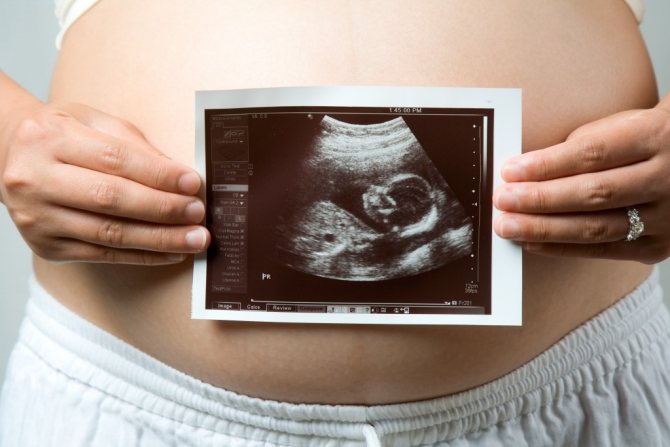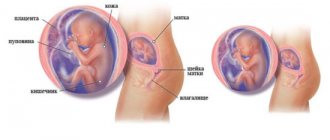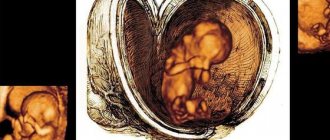Child
Fetal development at 9 weeks of pregnancy
The small head remains disproportionately large to the body, but the back is already beginning to straighten, and the neck is visible. The eyes are still covered with eyelids. The rudiments of baby teeth begin to form and the embryonic “tail” disappears. Tiny fingers form on the palms, and it is during this period that a unique “foot print” pattern is formed, the bone and cartilaginous systems are strengthened, and the elbows are clearly visible. The baby's heart now consists of 4 chambers, making 130-150 beats per minute.
See how your baby will develop throughout your pregnancy:
Shutterstock/Fotodom Ukraine
Fetal development at 9 weeks of pregnancy

What am I doing there
Starting this week, I'm growing twice as fast, and I already have a big toe.
I am a warm wave of love
My baby!
You are making your first independent movements!
Your arms and legs have grown a little, and your feet and fingers have lengthened. Your head takes on its usual shape, your neck develops. I don’t know yet whether you are a boy or a girl, but I love you simply because you exist. The most important thing is that you develop into a healthy baby. And I surround you all with a feeling of happiness. It is important for me that you feel this feeling from the first moments of your life, even before birth. This makes my desire to give health and strength to every cell of yours even stronger.
I don’t feel your movements with my eyes, but a feeling of tenderness overwhelms me when I think and imagine that you, like a little fish, are waving your tiny arms and legs, like fins, in me, and I give you peace and happiness.
I think about you a little every day. I lower my hands to my stomach and breathe in and out slowly. Like an ocean, I slowly roll them back and forth, turning them into warm waves of love.

“The Miracle of a New Life” is a coloring book for expectant mothers from psychologist, best-selling author of books for mothers Tatyana Aptulaeva and illustrator Alena Ustinova.
Mother
What happens at 9 weeks of pregnancy
Your uterus is already the size of an orange, but your tummy is not protruding yet, and no changes are felt to the touch.
Feelings at 9 weeks of pregnancy
- As your blood volume continues to increase, you may feel dizzy or have a frequent urge to urinate. Bulging veins in the arms and legs or bleeding from the nose are also a sign that blood is now being produced in double quantity: for you and the baby.
- Perhaps this week you will feel a slight increase on the scale. This is normal, because the body gradually begins to accumulate fat tissue.
- The breasts also enlarge, the areolae become more convex and darken. The body prepares for breastfeeding by actively producing prolactin.
- During this period, you may feel waves of inexplicable fatigue and a constant desire to lie down, so try to rest and relax more often.
- If toxicosis continues or has just begun, then you feel nauseous in the morning. This is normal and will go away on its own in a couple of weeks. If you are vomiting several times a day, then consult your doctor, he will tell you how to reduce such vivid manifestations of toxicosis in the first trimester.
Maternity hospitals and perinatal centers in Ukraine: addresses, descriptions, reviews.
Analyzes
If you do an ultrasound, then at week 9 it will already show how the baby’s heart is beating, and with its help the doctor will be able to assess the baby’s motor activity.
If this is your first visit to the doctor, you will need to undergo tests:
If you haven’t been to the doctor last week and haven’t had tests done before conception, the following will be helpful:
- general blood analysis,
- general urine analysis,
- determination of blood group and Rh factor,
- bacterioscopic examination of smears of the vagina, urethra, cervical canal,
- blood test for HIV, hepatitis B (HbSAg), hepatitis C (HCV) and syphilis (RW).
Elena Berezovskaya
Researcher, obstetrician-gynecologist, author of the book “A Desk Guide for Pregnant Women”, founder and director of the International Academy of Healthy Life, Toronto, Canada doctorberezovska.com, facebook.com/dr.olena.berezovska, instagram.com @dr_olena_berezovska
If you have no complaints about increasing bleeding and pain in the pelvis, there are no other symptoms that cause significant discomfort (severe vomiting), then the first visit to the antenatal doctor should take place at 8-10 weeks. This is the optimal period for diagnosing pregnancy and determining its duration.
The first mandatory ultrasound is usually done at the 9th week.
What vitamins can pregnant women take?
Pregnancy is not a disease that is accompanied by the removal of vitamins and mineral complexes from the body, therefore vitamin therapy is not indicated during pregnancy. The exception is folic acid, which is recommended to be taken at least 4–6 months before pregnancy and up to 10–11 weeks of pregnancy. Folic acid is actively used by the mother’s body to form the child’s nervous system (and this process begins from the first stages of pregnancy until 10–11 weeks). Therefore, taking folic acid is the only WHO recommendation for taking vitamins. And this recommendation applies to everyone, regardless of the family’s social status and standard of living.
Be sure to eat these foods to have a healthy baby!
Obstetric ultrasound, first trimester (from 3 to 9 weeks)

What is obstetric ultrasound, first trimester (from 3 to 9 weeks)? Proper examination to a specific standard has now been proven to be a useful tool in many institutions around the world, and there is a need to promote widespread use of these types of ultrasound guidelines. The World Health Organization and many national scientific associations have developed the following recommendations for examining women at various stages of pregnancy. The developed recommendations are aimed at adequate use of the ultrasound diagnostic method, since both a study that is too simple and short-term, and one that is too complex and long-term, can ultimately lead to improper management of the patient and incorrect assessment of the condition of the fetus. Why is it important to do an obstetric ultrasound, first trimester (from 3 to 9 weeks)? First trimester (10 - 14 weeks of pregnancy) Confirm pregnancy. Carry out an accurate determination of the gestational age. Determine the location of the fertilized egg (intra- or ectopic). Number of fruits (one or more). Rule out hydatidiform mole. Exclude a mass formation in the pelvic cavity, simulating pregnancy. Confirm the viability of the embryo. Confirm pregnancy. The possibility of visualizing the fetal sac in the uterine cavity appears at the 5th week. All assessments of gestational age using ultrasound are carried out starting from the first day of the last menstrual period (in embryology books, the first day of the appearance of the fertilized egg is used as a starting point, so this 5th week, according to ultrasound, is the 3rd - from an embryological point of view). Carry out an accurate determination of the gestational age. The most accurate determination of gestational age in this early period (with an accuracy of 2-3 days) is made mainly by measuring the coccygeal-parietal size, starting at approximately 6 weeks. Earlier dates of determination can be established by measuring the size of the fetal sac. From the 12-13th week, you should abandon the determination of the coccygeal-parietal size and move on to measuring the biparietal size, which in the early stages of pregnancy has an accuracy of 5-7 days. Determine the location of the fertilized egg (intra- or ectopic). Visualization of the fetal sac in the uterine cavity does not exclude the presence of an ectopic pregnancy. In 1 out of 10,000 normal intrauterine pregnancies, an ectopic localization of the second fetal sac also occurs simultaneously. Interstitial (intramural) pregnancy is diagnosed in cases where the thickness of the myometrium surrounding the fetal sac is uneven. Number of fruits (one or more). Multiple pregnancy can be easily detected by ultrasound at 5 weeks. Given the high incidence of spontaneous miscarriage of a second or third embryo occurring at this early stage, some authors suggest not informing mothers about this condition. However, the information should reach the attending physician, because the miscarriage of one of the embryos will clinically manifest itself as a spontaneous miscarriage and may serve as an erroneous indication for curettage. When visualizing at 6-7 weeks, the number of embryos and their mono- or biamniotic location should be indicated. Rule out hydatidiform mole. Amenorrhea, positive test results for pregnancy, and an enlarged uterus may suggest hydatidiform mole. An ultrasound examination can confirm the presence of multiple small cysts occupying the uterine cavity or indicate the presence of a fetal sac. Exclude a mass formation in the pelvic cavity, simulating pregnancy. Pregnancy can be simulated by ovarian cysts and uterine fibroids. Some hormonally active ovarian tumors can also mimic pregnancy by producing positive results on blood tests. Some of these masses may develop early in pregnancy, interfering with normal fetal development. Confirm the viability of the embryo. When the report says “ultrasound reveals a living embryo (fetus),” it is strongly recommended to take an M-mode image of the embryo's heartbeat. Recorded heartbeats can be important evidence in resolving certain legal problems.
Which doctors should I contact for consultations on obstetric ultrasound, first trimester (from 3 to 9 weeks)?
Ultrasound Doctor Gynecologist-Obstetrician
Keywords pregnancy, ultrasound
Nutrition
The baby now increasingly needs fluid and nutrients, which he draws from your body. Therefore, the skin of the expectant mother becomes drier and more sensitive. Drink more fluids or lean on foods that contain a lot of water - seasonal watermelon, melon, cucumbers.
If you have toxicosis, then there may be problems with nutrition. If the smell or sight of a food makes you sick, eliminate it from your diet for now. Let the food be simple, single-ingredient and nutritious, for example buckwheat, rice milk porridge, steamed cutlets, cottage cheese, any fresh or steamed vegetables and fruits. Soon the period of toxicosis will end and you will return to your usual menu.
Chorion in the 9th week of pregnancy
Chorion is the placenta, or baby's place, in the language of obstetricians. The chorion is connected by the umbilical cord to the fetus, that is, it is also a connecting element between the body of the expectant mother and the intrauterine child, through which nutrients are supplied to the latter.
If an ultrasound examination shows that the chorion is closer than six centimeters to the os of the uterus, this location is called placenta previa (chorion previa).

What is the danger of this presentation:
- risk of miscarriage;
- caesarean section during delivery;
- threat of placental abruption and severe bleeding.
Belly photo
At 9 weeks of pregnancy, a photo of your belly still won’t reveal that you’re pregnant: the baby weighs only 8 grams. But it may seem that the belly is already starting to grow: this is due to the fact that the hormone progesterone slows down the intestines, resulting in bloating, constipation and gas.

Source: GettyImages
Weight
Weight gain continues, but only slightly - up to 700 grams. Consultation with a doctor is necessary if:
- you have gained more than 1.5 kilograms - you need to make adjustments to your diet;
- If you have gained less than 300 grams and have severe toxicosis, you need medical supervision.
In the second case, even hospitalization and restoration of electrolyte balance are possible.
At each appointment, your pregnancy doctor should weigh you and monitor your weight. The countdown starts from the day of the first intake.

Source: GettyImages
Sex
Some expectant mothers experience an increased need for sex during pregnancy, while others, on the contrary, do not experience much sexual desire. Therefore, continue to have sex with your husband as before pregnancy, if there is no threat of miscarriage.
If you have no time to think about sex right now, talk about it with your spouse. Don't worry, he will definitely understand you and is unlikely to be offended. After all, you are carrying your common baby! And with the onset of the second trimester, sexual energy will certainly return to you.
At 9 weeks of pregnancy, sex is not prohibited during the normal course of the process. Check this issue with your doctor and pay attention to alarming symptoms. It is necessary to limit your sex life and contact a gynecologist if you notice:
- bleeding;
- high temperature (more than 37.5 degrees);
- severe toxicosis with vomiting.

Source: Shutterstock
Is it possible for a pregnant woman to undergo salon procedures?
Fear of pregnancy
The doubts that arise when learning about pregnancy are similar. Often they are associated with a number of obstacles that prevent you from freely and joyfully accepting a child into your life. How can you help overcome these difficulties?
- Try to leave thoughts like: “But if there was no child, then this would be the case, and I (or we) could do this and that...” This is all conditional mood. But in reality, YOU ALREADY HAVE A CHILD. And there are still 9 months to calm down, accept this fact, prepare for the birth of the Baby and provide him with a favorable start in life.
- Analyze and honestly answer yourself, without hiding behind general words, what exactly scares you about the fact of having a child. The most common reasons for a child’s “unwantedness” are financial difficulties, difficult relationships with the child’s father and his reluctance to accept the fact of paternity, early pregnancy and an unsettled life, career plans that the child does not fit into, unwillingness to bear responsibility, and fear of losing independence. As a rule, future parents are well aware of what they are losing with the birth of a child, and have no idea what they are gaining.
- Try to imagine how your child feels, because despite the fact that he is still very tiny, he is able to react to impulses coming from you and even imprint them. And it’s better if his first impression of this world is “they’re waiting for me, I’m welcome,” and not “the dearest people don’t need me.”
- Forgive yourself all your doubts and... wait until the 18-20th week of pregnancy - this is the period when many expectant mothers change their attitude towards what is happening.
- There is an opinion that Baby will always understand his future mother and help her - he is always at one with his mother. Thus, the famous Canadian psychologist and philosopher Liz Burbo advises talking to your Baby, explaining to him what is happening to you, imagining how he listens, what he might think and what he would answer to his mother. Don’t worry about the fact that your baby still feels, understands, and worries differently than adults. Remember that only you can convey joy, sadness, anxiety to him now, you can calm him down and even (!) cheer him up.










